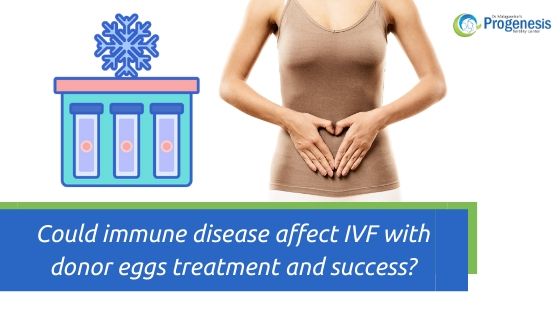If your body has an autoimmune disease; sadly, it may affect IVF success rate, your immune system works to inhibit the growth of healthy cells. Men and Women with existing autoimmune conditions may be at higher risk of infertility.
What is an autoimmune disease?
First, you need to have a conceptual understanding of the term autoimmune disease. It is a condition when your body’s immune system erroneously attacks healthy tissues and cells in the patient’s body. The result is the triggering of a self-destructive inflammatory response. The body’s immune system cannot distinguish between the healthy and harmful cells in your body.
Autoimmune Disease and infertility
Sometimes a person suffering from autoimmune disease produces antibodies against ovaries resulting in a condition called primary ovarian insufficiency, also known as a premature ovarian failure. It means that only a few follicles are present in the woman’s ovary.
Alteration in the hypothalamic-pituitary-gonadal axis may be a symptom of autoimmune disease. For valuation, there must be a proper synchronization between the hypothalamus, the pituitary gland, and the ovary. On the offset, that there is a blockage or impairment in any part of the axis, ovarian dysfunction may occur even worse the ovary may stop functioning. Again, such outcomes could be the symptom of an autoimmune disease.
Autoimmune disease, infertility, and possible outcomes
There are two ways in which one can deal with the problem; preservation of fertility may be an answer. If a woman is diagnosed with a disease called Hashimoto, then preserving the eggs can be a good option before starting the medication. In the process, doctors try to hyper stimulate the ovary collecting as many eggs as possible. Successively the eggs are collected under anaesthesia, and the use of vitrification method freezes them. The fertility rate is independent of the duration for which the egg is preserved in a frozen state. The survival rate of the vitrification-preserved egg is nearly 85 to 90 per cent.
As far as men are concerned, autoimmune diseases reduce the sperm count, but there is a way around in testicular biopsy. In this process, a sample of the sperm is gathered from the testicle, which is then frozen and stored. The preserved sperm can be later utilized during IVF.
Autoimmune diseases and IVF
If you have never considered the preservation of your fertility the underlying problems, the underlying problem can be addressed with proper infertility treatment like IVF. Women under the age of 35 with mild autoimmune disease may opt for the use of a technique called intrauterine insemination that improves IVF success rate. Here, the sperm of a male partner is injected in the uterus with the help of a catheter. As far as treatment with own eggs is concerned, the success rate is a variable of the patient’s age. If it comes to egg donation o striking differences are observed. For a successful IVF treatment, it is essential to stabilize the disease before commencing the treatment because the success of the IVF procedure depends on it.
How is your immune system related to pregnancy?
Your immune system is your “guardian angel”. Its job is to protect the inner body from external invaders such as bacteria, viruses, worms, and fungi. Then, it destroys cancerous cells, and deformed cells fix the cell wall and heal wounds, cuts, cuts, injuries, and infectious diseases. You cannot live without it – quite literally.
You have probably heard of “Fallen Angels,” Have good angels ever been bad. Well, that happens to your immune system too. Instead of fighting real threats and dangers, you can use harmless substances like pollen, food, bees, animals, tissue, and semen.
People who are unfamiliar with immune problems but have been diagnosed with infertility problems or miscarriages after the test they need to be on guard. You must understand that testing for immune problems in a routine of the fertility check-up. There is usually a chance of failed pregnancy from some IVF functions where the immune system of fetes has some issue. However, the foetus of good quality are less vulnerable to failed conception should not be pregnant. It only happens on tour. In the case of true unwarranted sterility, doctors also check for any immune disorders.
Fertility-related immune disorders are difficult to diagnose, and the treatment plan needs to address specific needs. In most cases, IVF and close monitoring of pregnancy lead to success.
Nutritional supplements are a great way to make sure your body has what it needs to support and strengthen the immune system. Do not wait for your pregnancy to start vitamins before delivery. Folic acid is essential for healthy pregnancy and probiotics should be taken into account to balance the bacteria in the body and improve digestion. Before consuming any dietary supplement, please consult with your doctor to know if it is suited for you. It will thwart of risk and chances complication.

